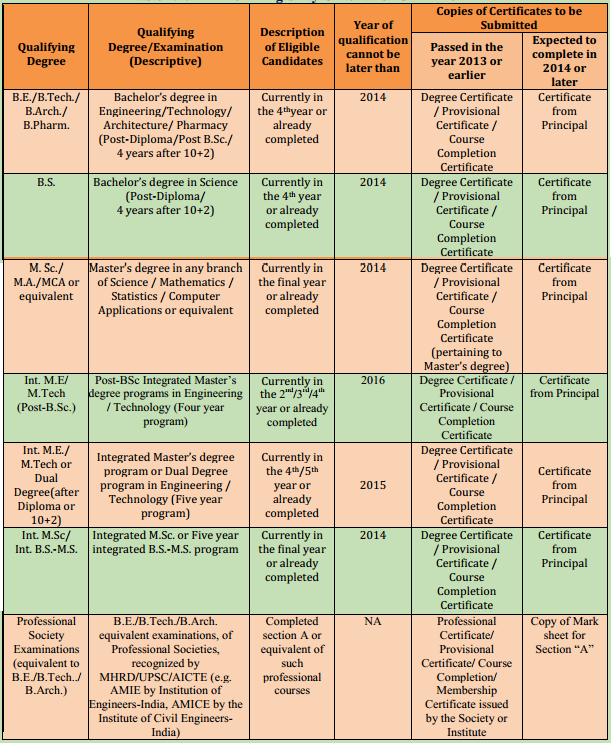Staff Selection Commission (SSC) holds a Combined All India Open Examination for recruitment of Civil, Electrical, Mechanical Junior Engineers posts in the department of Central Public Works Department (CPWD), Department of Posts, Border Roads Organisation (BRO) in Ministry of Defense, Military Engineering Service (MES), Central Water Commission (CWC) and Farakka Barrage.
Eligibility Criteria Required to apply for SSC Junior Engineer posts are as below:
Age Limit: Candidate must be between the age of 18 to 32 years at the time of applying (Maximum age varies according to department for which candidate is applying).
Education Qualification: Candidate must have Degree or Diploma in Civil or Electrical or Mechanical Engineering from an institution recognized by Govt. of India or equivalent qualification.
NOTE: Candidates who have not acquired the educational qualification at the time of applying will
not be eligible to apply. Final year candidates are not eligible to apply.
SSC Junior Engineer Examination Pattern: Selection process consist of a Written Examination (500 marks) followed by Interview (100 marks).
SSC Junior Engineer Written Exam Pattern: Written exam will consist of Paper I (Objective type) and Paper II (Conventional Type).
| Paper | Subject | Max. Marks | Time Allotted |
| Paper I | (i) General Intelligence & Reasoning
(ii) General Awareness
(iii) General Engineering
in —
Part–A– Civil & Structural OR
Part-B– Electrical OR
Part-C– Mechanical
| 50
50
100 |
2 hours |
| Paper II | General Engineering in
Part–A– Civil & Structural
OR
Part-B– Electrical
OR
Part-C– Mechanical
|
300 |
2 hours |
NOTE:– In Paper-I and Paper-II for General Engineering, the candidate will be required to attempt only one part i.e. Part-A or Part-B or Part-C as per choose discipline.
– Paper-I will consist of Objective Type Multiple Choice questions only. Answer-sheets of Paper-II (Conventional Type) will be evaluated in respect of only those candidates who qualify in Paper-I.
– Negative marking of 0.25 marks for each wrong answer will be done in Paper-I.
SSC Junior Engineer Personality Test / Interview: Candidates who secure at least the minimum qualifying marks in the written examination as may be fixed by the Commission at its discretion, will be eligible to appear in the Interview. Interview will be of 100 marks.
Some of the books which can help candidates to prepare for Staff Selection Commission Junior Engineer or SSC Junior Engineer Exam are suggested as below-
1) Books for SSC Junior Engineer General Intelligence & Reasoning:
2) Books for SSC Junior Engineer General Awareness :
3) Books for SSC Junior Engineer General Engineering: Electrical, Mechanical, Civil & Structural Engineering Discipline respectively.
These books consists of all the related topics at one place.
Syllabus for SSC Junior Engineer Examination: The standard of the questions in Engineering subjects will be approximately of the level of Diploma in Engineering (Civil/ Electrical/ Mechanical) from a recognized Institute, Board or University recognized by All India Board of Technical Education. All the questions will be set in SI units. The details of the syllabus are given below:
Paper-I
(i) General Intelligence & Reasoning: The Syllabus for General Intelligence would include questions of both verbal and non-verbal type. The test may include questions on analogies, similarities, differences, space visualization, problem solving, analysis, judgement, decision making, visual memory, discrimination, observation, relationship concepts, arithmetical reasoning, verbal and figure classification, arithmetical number series etc. The test will also include questions designed to test the candidate‘s abilities to deal with abstract ideas and symbols and their relationships, arithmetical computations and other analytical functions.
(ii) General Awareness: Questions will be aimed at testing the candidate‘s general awareness of the environment around him/her and its application to society. Questions will also be designed to test knowledge of current events and of such matters of everyday observations and experience in their scientific aspect as may be expected of any educated person. The test will also include questions relating to India and its neighboring countries especially pertaining to History, Culture, Geography, Economic Scene, General Polity and Scientific Research, etc. These questions will be such that they do not require a special study of any discipline.
(iii) General Engineering (Civil and Structural), (Electrical & Mechanical):
Part-A Civil Engineering:
Building Materials, Estimating, Costing and Valuation, Surveying, Soil Mechanics, Hydraulics, Irrigation Engineering, Transportation Engineering, Environmental Engineering.
Structural Engineering – Theory of Structures, Concrete Technology, RCC Design, Steel Design.
Part-B Electrical Engineering-
Basic concepts, Circuit law, Magnetic Circuit, AC Fundamentals, Measurement and Measuring instruments, Electrical Machines, Fractional Kilowatt Motors and single phase induction Motors, Synchronous Machines, Generation, Transmission and Distribution, Estimation and Costing, Utilization and Electrical Energy, Basic Electronics.
Part-C Mechanical Engineering –
Theory of Machines and Machine Design, Engineering Mechanics and Strength of Materials, Properties of Pure Substances, 1st Law of Thermodynamics, 2nd Law of Thermodynamics, Air standard Cycles for IC Engines, IC Engine Performance, IC Engines Combustion, IC Engine Cooling & Lubrication, Rankine cycle of System, Boilers, Classification, Specification, Fitting & Accessories, Air Compressors & their cycles, Refrigeration cycles, Principle of Refrigeration Plant, Nozzles & Steam Turbines. Properties & Classification of Fluids, Fluid Statics, Measurement of Fluid Pressure, Fluid kinematics, Dynamics of Ideal fluids, Measurement of Flow rate, basic principles, Hydraulic Turbines, Centrifugal Pumps, Classification of steels.
Paper-II Download SSC Junior Engineer Paper-II Syllabus for Electrical, Mechanical, Civil & Structural from here.
http://ssc.nic.in/notice/examnotice/Draft%20Notice%20JE%202014.pdf
http://www.topjobsite.in/2014/03/best-books-for-ssc-jr-engineer-exam.html
We wish our candidates All The Best for the Upcoming Exams and wish them great future ahead!!
Leave a comment below for any further queries or suggestions.




